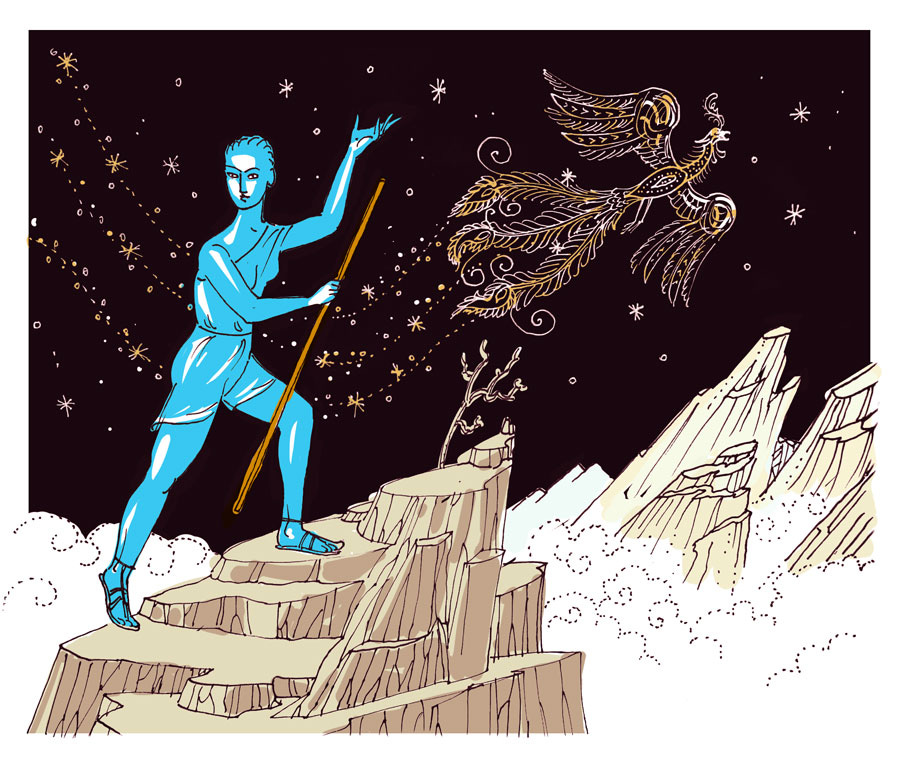Conscious Love
Then said Almitra, Speak to us of Love. And he raised his head and looked upon the people, and there fell a stillness upon them. And with a great voice he said: When love beckons to you, follow him, Though his ways are hard and steep. And when his wings enfold you yield to him, Though the sword hidden among his pinions may wound you. And when he speaks to you believe in him, Though his voice may shatter your dreams as the north wind lays waste the garden. For even as love crowns you so shall he crucify you. Even as he is for your growth so is he for your pruning. Even as he ascends to your height and caresses your tenderest branches that quiver in the sun, So shall he descend to your roots and shake them in their clinging to the earth.
— Kahlil Gibran, The Prophet.
1.
One awakens to love in rare moments of exquisite agony — facing births, deaths, and moments of crisis — but otherwise we succumb to the flow of days in a state of numbness. We know nothing about love; our culture is devoid of it.
To live in love is to live in a state of upheaval, of continuous death and rebirth. Most of us expend the power of every thought and impulse to avoid love and its complications, its intensities, until life provides a crisis to disrupt the complex strategies we employ to shield ourselves from pain.
The path of love prescribes pain, which our instinct for self-preservation seeks to avoid at any cost. When painful feelings arise, the intellect creates a story of righteous martyrdom or abject victimhood to buffer our sensitivity to pain and prevent us from learning anything from it.
2.
What we think we know about love is a set of complex attachments that prevent us from loving. The feelings commonly associated with love come with the satisfaction of desires or expectations met through our relationships.
We say we love our partner, but at best they merely buffer the discomfort of our dependencies. They become an accessory to our crimes against love, or they become a slave to the stories we tell ourselves about love.
We say we love our pets and children, but in truth they are merely tools for increasing our self-appraisal and sense of moral aptitude. If we show them generosity, it is only to fuel our pride. We are devoted to them until they disappoint us, and then we get mad at them.
We say we love our work, but that is a great deception that we practice to mask our attachment to the stories of wealth, prestige or utility that attend it. We say we love our friends, but that is only to trick ourselves into not feeling lonely. We say we love the earth, but that is only so that others may think that we care about something grander than our own interests.
3.
When somebody is awake to love, even just a little, they are living with pain that nothing in this world can assuage. Once the pain subsides, most people forget about it and return to business as usual, unchanged by their experience.
Others turn to religious or mystical inquiry, seeking a way to understand love as a vehicle to what is real and true. Whilst this is undoubtedly saner than living out the tendency to self-preservation and relentless satisfaction of one’s desires, it is not without its pitfalls.
Spiritual ecstasy — which is often mistaken for love — re-orients one’s concept of love away from outer attachments and towards inner experience. It is a useful navigation tool: for anyone who has lived through a process of recovery, such experiences signal a turning point.
Ecstatic experiences affirm the infallible truth of one’s will to heal, giving purpose to the pain of the recovery process. But ecstatic experiences are also replicable, brandable, and marketable, and therefore far easier to conjure up in a consumer economy than genuine miracles.
So when people with wealth and resources get a taste for them, there is no shortage of ‘authentic’ rituals, ceremonies and retreats that ‘awaken’ this excuse for love. This tendency presupposes that love is a commodity to be gained from somewhere, by doing something.
However, if we get too attached to states of ecstasy then they inevitably fail us, being transient phenomena. The pain of despair naturally succeeds an ecstatic experience, the trough that follows a peak.
Again, this has nothing to do with love; it is another, more refined excuse we make for love’s absence.
4.
I have lived out the painful consequences of these delusions enough times to understand that love is neither a feeling nor an experience: that the feelings and experiences I have mistaken for love are most often the temptations that lead me astray from it.
Love, in my world, is a quality of consciousness that awakens through will and intention. When love is allowed, it creates the world of my experience and the meanings I make of it. It is the strength of spirit that allows me to surrender.
5.
Conscious love is the willingness to remain unconditional in our relationships and in our habits of living. When a commitment is made to love over time, states of bliss flow naturally into ordinary experience.
In partnership, in the presence of a most familiar companion and amongst the ordinary vicissitudes of the life we share, a space opens up between our hearts: an intimate knowing of holy nothingness, of the infinite context that creates all the possibilities emerging between us. We see this in each other.
In prayer, when it is an act of true communion, the transitory and limited sense of self dissolves in the bliss of pure being, as a single grain of salt merges with the ocean. This state of consciousness eclipses the concepts of giving or receiving; for there is nothing to bestow, nor anything to collect, only love revealing the truth of its own perfection.
But bliss is only one of love’s many languages. The language of pain is the one I know better, for it challenges me to remain unconditional when life gets intense.
It is painful to love the world as a mother bereaved: nothing I experience brings any consolation for my loss. Sometimes it feels as though I am half-alive, living out my days restlessly between this world and the next. Succumbing to this void of love, I should sooner or later lose my will to live.
To continue loving at such times is the true measure of my powers. For in loving, a presence awakens that knows what is real and what is not. And what is real is not what lives and dies.
The wisdom of that love guides my purpose; it is the presence that moves me to write these words.
When you love you should not say, “God is in my heart,” but rather, “I am in the heart of God.”
And think not you can direct the course of love, for love, if it finds you worthy, directs your course.
— ibid.
For this month’s post I was planning to publish a heavy thinkpiece about the successional dynamics of community, which I have been working at for a year. But this reflection on love danced out instead, an unexpected gift. Share it around, lovers.
But I still haven't finished my serious essay. Would anyone be willing to help out with revisions? Leave a comment below and I’ll send a draft your way.
Recommendations
Oliver Hunter, my longtime friend and creative collaborator, recently published The Heptateuch of Eve — an apocryphal prehistory of Eden, with each of its seven parts framed by tantalising segments of an archaelogical treasure-hunt set in a carnivalesque distortion of our apocalyptic present age.
The tale forms a part of The Wanderer’s Library, a collaborative and interactive storyworld constructed virtually on a premise similar to the Akashic records — that everything we experience and understand as reality is documented somewhere in the metaphysical realm. A new corner of the internet for me, and well worth exploring.
I have a soft spot for apocrypha, and The Heptateuch satisfies on a few different levels. Eve — the most problematic figure in Genesis — is invested with the hierophantic agency of a demi-god in her leadership of the forebears of Adam. Cain, for whom the tale is a partial apologia, is treated of with the depth of psychological nuance characteristic of high epic. Notwithstanding its brevity, The Heptateuch of Eve is a complex figuration of mythopoeic and allegorical beings; it is a pleasure to read for those of us who like that sort of thing.
An endless book unwrites me
Whose hand will never cease
And all the libraries that ever were
Could not contain this verse
— From ‘Wanderers Along The Shoreline.’

The mind of Josh Pillay is undoubtedly brilliant: it is a mind trained in subtlety and nuance, and honed through experience to the pitch-perfect presentation of pithy insights in the weekly essays of Wait! Just Listen. But the power of this newsletter lies beyond the reaches of intellect alone: Pillay brings a candour and deep sensitivity to his treatment of the condition of being a human right now, and his writings shine forth with the wisdom of an awakened heart.
Pillay is at ease in states of ambiguity, and his deep dives into creative ideation are an effective medium for disrupting the myths we make through polarised thinking; the essays disturb the comfortable opinions we forge in the process of deluding ourselves. Seemingly complex positions are reconciled with grace and ease; abstruse concepts and paradoxes dissolve into resonant and powerful meditations on our connection to beauty.
His recent essay On Education is utterly replete with quotables, but this paragraph in particular gave me the chills:
If we are thoughtful and tender enough with ourselves, the terror of failure, loss and pain cusps into transcendence and the grief into gratitude. We start to see, bit by bit, a nonspecific warmth enveloping everything that ever was and ever will be. We arrive at the conclusion that we are nothing more than particles/atoms passing between; particulate miracles bewildered and bewildering in their passage. Through this rather elemental view of life - as a series of vibrational atoms dancing to the frequency of a universal hum - we eventually grasp the fact that no matter the outer atmosphere of circumstance, one has the agency to remain resilient and seek the fruits of its lessons rather than wither under it.
If you love posts about love, I wrote here about my first taste of it and here about a mango that was more than just a mango.
Are you new to Surrender Now? If you’d like a refresher on the story so far, you can download the ebook of Volume I for free, or dive straight into the first chapter of Volume II.






“the feelings and experiences I have mistaken for love are most often the temptations that lead me astray from it.” So beautiful and so very true.